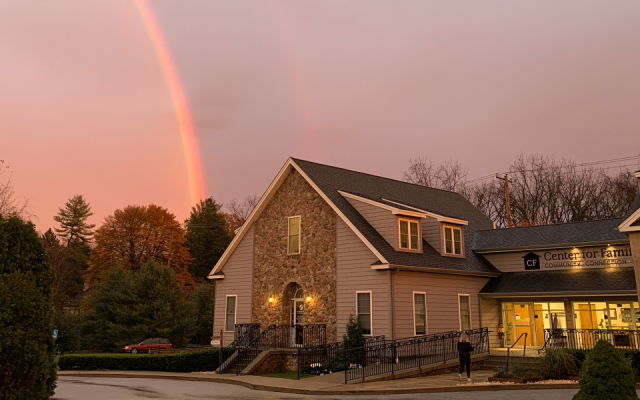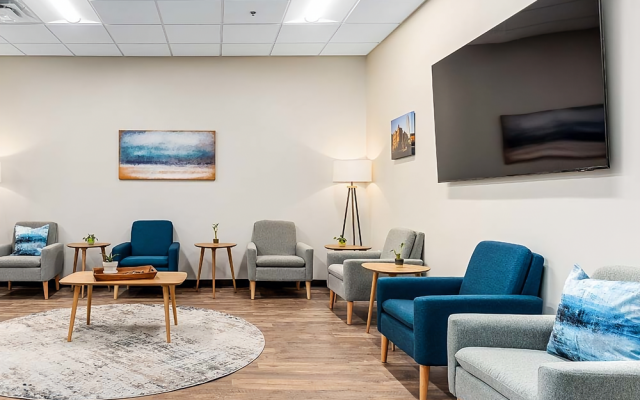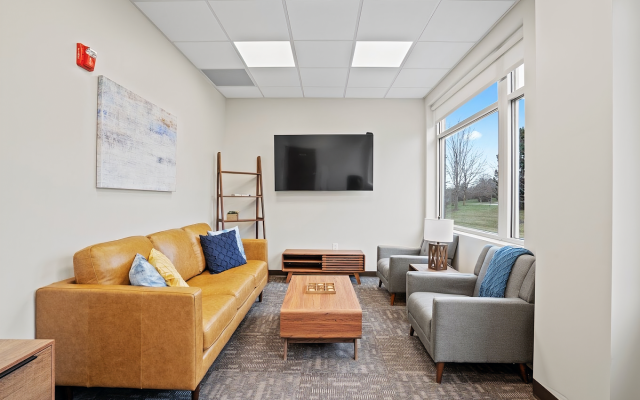
Orange County, California, United States
Newport Academy All Genders
Verified
Verified
This provider’s information has been quality-checked by Recovery.com’s Research Team for accuracy and completeness, including center verification through appropriate third-party organizations.
Joint Commission Accredited
The Joint Commission accreditation is a voluntary, objective process that evaluates and accredits healthcare organizations (like treatment centers) based on performance standards designed to improve quality and safety for patients. To be accredited means the treatment center has been found to meet the Commission's standards for quality and safety in patient care.
Provider's Policy
The insurances listed represent the current in-network partners for this location. While not shown here, Newport also accepts many out-of-network plans and are happy to work with you to explore coverage options.
Estimated Cash Pay Rate
The cost listed here (Call For Rates) is an estimate of the cash pay price. Center pricing can vary based on program and length of stay. Contact the center for more information. Recovery.com strives for price transparency so you can make an informed decision.
Highlights from the Center
Highlights
These highlights are provided by and paid for by the center.
1-on-1 Counseling
Certified Professionals
Adolescents
About Newport Academy All Genders
Newport Academy’s All-Gender program in Southern California offers highly structured residential care, with personalized treatment plans and identity-affirming care based on the specific issues patients face—whether that’s trauma, gaming or tech addiction, eating disorders, substance use, or other mental health issues. This nurturing experience creates a space for compassion, trust, and camaraderie among residents. Healing extends to families too, with family involvement and weekly family therapy.
Personalized And Family-Wide Recovery
Patients begin treatment with an assessment to properly gauge their needs and treatment requirements. From there, a personalized care team that includes counselors, nurses, a psychiatrist, and dietician continues to meet the needs of each teen. Newport Academy uses attachment-based family therapy (ABFT) to help rebuild familial relationships. Individual and group therapy connect patients to themselves and their peers, building a support network that Newport also extends to families. Newport Academy’s all-gender program provides group therapy on topics like gender dysphoria, coming-out, social acceptance, and identity.
Healing The Mind And Body
Newport Academy creates individualized treatment plans that include equine therapy, music and art, yoga, meditation, adventure therapy, and a host of evidence-based therapies. Clients in their all-gender program live in an on-campus home dedicated to their comfort. Their location in Southern California keeps teens close to nature, enhancing their care experience and privacy. Newport Academy values incorporating experiential therapies into their clients' schedules. Some adventure therapies include hiking, rock climbing, cross-country skiing, snowshoeing, and enjoying all the nearby nature. Other holistic therapies offered at Newport Academy include yoga, meditation, music therapy, fitness, and art therapy.
On-Site Academics
Newport Academy keeps teens on track with their school, offering tutoring and individualized schooling programs. On-site teachers incorporate academic progress with therapeutic care, giving teens a safe space to learn and heal. Newport Academy in Utah is accredited by The Joint Commission and covered by most private insurance providers.
Read More
Insurance Accepted
Provider's Policy:The insurances listed represent the current in-network partners for this location. While not shown here, Newport also accepts many out-of-network plans and are happy to work with you to explore coverage options.
More Newport Healthcare Locations
Gender-Affirming Care
Newport Academy’s Southern California location provides a specific home for LGBTQ+ and non-binary teens. They partner with the Trevor Project for specialized staff training on LGBTQ+ issues, treatment approaches, and identity. Newport Academy treats each teen with the individualized care they need and deserve. Their team of professionals work to create custom care, using evidence-based methods with proven results and trackable, successful outcomes.
Academic Support
Teens continue school in treatment, led by Newport Academy’s accredited teachers. Just like their therapeutic care, teens receive an individualized academic plan, with 1-1 tutoring and peer support. This all begins in the same supportive and safe environment of treatment, with all academics on site and led by Newport’s teaching staff. Parents meet with teachers in parent-teacher meetings, allowing for connections and engagement between everyone involved.
Family-Wide Healing
Newport Academy extends healing to the whole family. Master-level therapists lead attachment-based family therapy to help teens and their parents heal strained relationships and make healthy ones. Educational sessions support parents in learning more about addiction and mental health, helping them become the supportive allies they strive to be. Together, teens and their families learn how to move forward with hope and cope with challenges as they come.
Treating Co-Occurring Disorders
Newport Academy’s all-gender program focuses on the unique needs of LGBTQ+ teens and their families. They treat primary and co-occurring conditions like addiction, disordered eating, depression, post-traumatic stress disorder (PTSD), self-harm, and anxiety. Newport Academy’s professional team uses a variety of evidence-based and experiential therapies to help each teen heal holistically.

Center Overview
Estimated Cash Pay Rate
Adolescents
Teens receive the treatment they need for mental health disorders and addiction, with the added support of educational and vocational services.
LGBTQ+
Addiction and mental illnesses in the LGBTQ+ community must be treated with an affirming, safe, and relevant approach, which many centers provide.
LGBTQ+ only
Those who identify as LGBTQ+ receive treatment for addiction and mental health with others in the community, making treatment highly relevant and effective.

Treatment Focus
You can admit to this center with a primary substance use disorder or a primary mental health condition. You'll receive support each step of the way and individualized care catered to your unique situation and diagnosis.
Treatment
Specializations
Adolescents
Teens receive the treatment they need for mental health disorders and addiction, with the added support of educational and vocational services.
Anxiety
Anxiety is a common mental health condition that can include excessive worry, panic attacks, physical tension, and increased blood pressure.
Co-Occurring Disorders
A person with multiple mental health diagnoses, such as addiction and depression, has co-occurring disorders also called dual diagnosis.
Depression
Symptoms of depression may include fatigue, a sense of numbness, and loss of interest in activities. This condition can range from mild to severe.
Drug Addiction
Drug addiction is the excessive and repetitive use of substances, despite harmful consequences to a person's life, health, and relationships.
Family Involvement
Providers involve family in the treatment of their loved one through family therapy, visits, or both–because addiction is a family disease.
LGBTQ+
Addiction and mental illnesses in the LGBTQ+ community must be treated with an affirming, safe, and relevant approach, which many centers provide.
Trauma
Some traumatic events are so disturbing that they cause long-term mental health problems. Those ongoing issues can also be referred to as "trauma."
Treatment Services
Residential
In a residential rehab program, patients live onsite, with access to daily treatment and 24-hour care. An average stay is 30-90 days.
Approaches
Evidence-Based
A combination of scientifically rooted therapies and treatments make up evidence-based care, defined by their measured and proven results.
Family Involvement
Providers involve family in the treatment of their loved one through family therapy, visits, or both–because addiction is a family disease.
Individual Treatment
Individual care meets the needs of each patient, using personalized treatment to provide them the most relevant care and greatest chance of success.
Therapies
1-on-1 Counseling
Patient and therapist meet 1-on-1 to work through difficult emotions and behavioral challenges in a personal, private setting.
Meditation & Mindfulness
A practiced state of mind that brings patients to the present. It allows them to become fully aware of themselves, their feelings, and the present moment.
Trauma-Specific Therapy
This form of talk therapy addresses any childhood trauma at the root of a patient's current diagnosis.
Art Therapy
Visual art invites patients to examine the emotions within their work, focusing on the process of creativity and its gentle therapeutic power.
Equine Therapy
Guided interactions with trained horses, their handler, and a therapist can help patients improve their self-esteem, trust, empathy, and social skills.
Experiential Therapy
With this approach, patients heal by doing. Therapists help patients process difficult emotions to speak, using guided activities like art or dance.
Eye Movement Therapy (EMDR)
Lateral, guided eye movements help reduce the emotional reactions of retelling and reprocessing trauma, allowing intense feelings to dissipate.
Family Therapy
Family therapy addresses group dynamics within a family system, with a focus on improving communication and interrupting unhealthy relationship patterns.
Horticultural Therapy
Gardening can be both meditative and inspiring. This therapy encourages social, emotional, and physical recovery.
Conditions We Treat
Anxiety
Anxiety is a common mental health condition that can include excessive worry, panic attacks, physical tension, and increased blood pressure.
Depression
Symptoms of depression may include fatigue, a sense of numbness, and loss of interest in activities. This condition can range from mild to severe.
Eating Disorders
An eating disorder is a long-term pattern of unhealthy behavior relating to food. Most people with eating disorders have a distorted self-image.
Gaming
Compulsive gaming is most often a problem for children and teens. The disorder can affect physical health, sleep, and the ability to focus at school.
Internet Addiction
Internet addiction is common among children teens. This compulsive disorder can damage relationships, school performance, sleep habits, and physical health.
Obsessive Compulsive Disorder (OCD)
OCD is characterized by intrusive and distressing thoughts that drive repetitive behaviors. This pattern disrupts daily life and relationships.
Post Traumatic Stress Disorder
PTSD is a long-term mental health issue caused by a disturbing event or events. Symptoms include anxiety, dissociation, flashbacks, and intrusive thoughts.
Self-Harm
The act of intentionally harming oneself, also called self-injury, is associated with mental health issues like depression.
Suicidality
With suicidality, a person fantasizes about suicide, or makes a plan to carry it out. This is a serious mental health symptom.
Trauma
Some traumatic events are so disturbing that they cause long-term mental health problems. Those ongoing issues can also be referred to as "trauma."
Substances We Treat
Alcohol
Using alcohol as a coping mechanism, or drinking excessively throughout the week, signals an alcohol use disorder.
Co-Occurring Disorders
A person with multiple mental health diagnoses, such as addiction and depression, has co-occurring disorders also called dual diagnosis.
Drug Addiction
Drug addiction is the excessive and repetitive use of substances, despite harmful consequences to a person's life, health, and relationships.
Aftercare
Experience
Special Considerations
LGBTQ group
Group therapy unites LGBTQ+ patients in a safe and culturally competent setting, encouraging peer support under the expert leadership of a therapist.
Off-Site Activities
Smoking and Vaping Policy
Professional Staff

Dr. Barbara Nosal
Chief Clinical Officer
PhD, LMFT, LADC

Dr. Joe Vaccaro
Regional Executive Director
PsyD

Dr. Michel Mennesson
Psychiatrist
MD

Dr. Rachel Fortune
Consulting Physician and Eating Disorder Specialist
MD, FAAP
View More Team Members
Learn more about Newport Academy All Genders
Testimonial
I have seen the power of Newport Academy and the amount of difference their program make. I was most impressed by the family program. Families enter broken and emerging better shape and function. I have experienced the program first hand and have also met many alumni who also have equally positive experiences.
Logan
We love hearing about your treatment experience
Help individuals and families seeking treatment by sharing your first-hand experience with this treatment provider. Review Guidelines.
















































